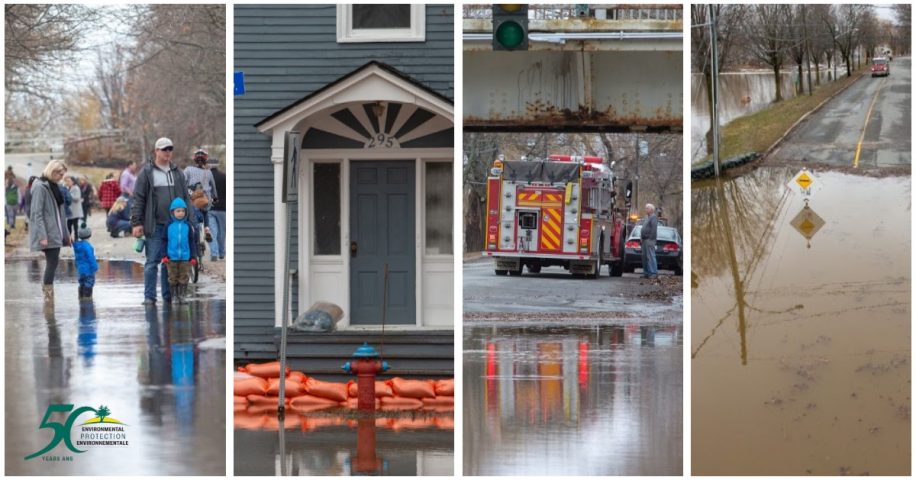Traditional Land of Wabanaki People/Fredericton — New Brunswick leaders updating the province’s climate action plan must heed the urgent call for rapid emissions reductions and greater nature protection outlined in the Intergovernmental Panel on Climate Change’s (IPCC) newest report.
The report, Climate Change 2022: Impacts, Adaptation and Vulnerability, released Feb. 28, says the already enormous costs of climate change will get worse and more deadly if governments around the world don’t slash greenhouse gas emissions deeper than current reduction commitments.
The scientists who compiled the report paint a global picture of a story already being told here in Atlantic Canada.
Last year, the federal government released the Atlantic Chapter of its Canada in a Changing World series. Canadian scientists contribute through their research to the IPCC 6th Assessment Report. We know Canadians are living with extreme events like heat waves, floods, droughts and wildfires. We know they are becoming more frequent, intense and long-lasting, harming people, infrastructure and the natural world.
In the Atlantic region, we already live with greater winter warming relative to other locations; and are at risk of higher sea levels relative to the global average. Sea level rise of at least a metre brings greater risk to coastal communities. Heavier precipitation in spring and winter increases hazards due to overland flooding. The warming rate in the Gulf of Maine and Bay of Fundy is among the highest in the world. Mental and physical health are at risk as are our natural resources and critical infrastructure.
Dr. Louise Comeau, Director of Climate Change and Energy Solutions, says the time for reports and mapping tools is long over. The provincial government is fully aware of the risks to New Brunswickers from a changing climate. It recently released its own flood hazard mapping tool.
“From Lameque and Shippigan to Shediac and the Isthmus of Chignecto to Saint Andrews, to communities all along the St. John River, New Brunswickers are at risk,” Comeau says. “Yet, the government has yet to set the rules and standards needed to move out of harm’s way and to prevent development in locations we know are at risk.
“The IPCC’s message is clear: Delay is irresponsible. Delay is putting peoples’ lives at risk. We must prepare now so that infrastructure, natural systems, communities and New Brunswickers can cope with a changing climate. At the same time, we must transform our energy systems over the next ten years to stop the pollution destabilizing our climate and putting natural systems and the people who rely on them at even greater risk,” Comeau says.
Governments around the world need to step up efforts and all jurisdictions must do their part. In New Brunswick, that means reforming our energy system to achieve 80 per cent renewable energy by the end of this decade, and greatly expanding programs that help citizens save money and reduce energy usage—from incentives and infrastructure to make electric vehicles an easier option for citizens, to programs that help low-income New Brunswickers replace old windows, doors and insulation through deep energy efficiency retrofits.
Matt Abbott, the Conservation Council’s Director of Marine Conservation, says greater protection of nature—from the land to the sea—must be a central part of New Brunswick’s climate action plan.
“When we protect nature, from our forests to our coastlines, we’re also protecting our communities and their ability to withstand the impacts of climate change,” Abbott says.
“We know that the Bay of Fundy is one of the fastest warming bodies of water in the world and that climate change— from sea-level rise to coastal erosion to ocean acidification—will have a devastating effect on coastal communities along the Bay of Fundy and the Northumberland Strait.
“The IPCC report is just the latest warning call that we must act faster to reduce the pollution unbalancing the climate if we want to protect the livelihoods of New Brunswick’s critical inshore fishers and coastal communities that depend upon a healthy ocean.”
-30-
About the IPCC assessment reports
Experts volunteer their time as IPCC authors to assess the thousands of scientific papers published each year to provide a comprehensive summary of what is known about the drivers of climate change, its impacts and future risks, and how adaptation and mitigation can reduce those risks. IPCC assessments provide governments, at all levels, with scientific information that they can use to develop climate policies. IPCC reports are drafted and reviewed in several stages, thus guaranteeing objectivity and transparency.
To arrange an interview, contact:
Jon MacNeill, Communications Director | jon.macneill@conservationcouncil.ca | 506-238-3539

